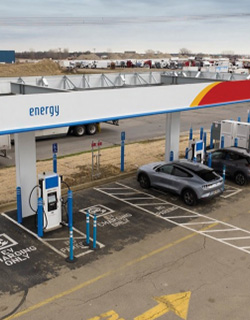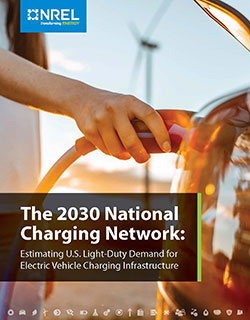Publications
Find reports and publications affiliated with the Joint Office of Energy and Transportation.

Recommendations for Minimum Required Diagnostics Information
January 2025
This report from the National Charging Experience Consortium (ChargeX Consortium) proposes a set of minimum required diagnostic information and recommends that the industry implement these uniformly across the North American electric vehicle charging ecosystem.

Implementation Guide of Customer-Focused Key Performance Indicators for Electric Vehicle Charging
January 2025
The National Charging Experience Consortium (ChargeX Consortium) developed this guide to describe how to calculate the interim set of KPIs that were established by ChargeX Consortium Working Group 1: Defining the Charging Experience in the report titled, “Customer-Focused Key Performance Indicators for Electric Vehicle Charging.”

Recommended Practice Seamless Retry for Electric Vehicle Charging
January 2025
This report from the National Charging Experience Consortium (ChargeX Consortium) proposes a seamless retry mechanism to increase public charging session success rates and improve the user experience.

ChargeX Prescribed Testing Program at CharIn June 2024 Testival: Outcomes and Future Recommendations
November 2024
The National Charging Experience Consortium (ChargeX Consortium) developed an optional prescribed testing program for electric vehicle and electric vehicle supply equipment manufacturers that attended the CharIN Testival as testers. This document details the journey taken in developing the ChargeX prescribed testing program to give insight to those interested in implementing their own version of prescribed testing in the future.

Recommended Actions to Improve Adapter Safety
September 2024
This report from the National Charging Experience Consortium (ChargeX Consortium) offers recommendations for improving adapter performance, reducing costs associated with failures, and improving the charging experience.

Standardized Protocol for Real-Time APIs as Required by Title 23 CFR 680.116(c)
September 2024
This report provides a standardized protocol for how to structure data, data update frequency, and practices for making the data required to be shared via application programming interface (API) usable for improving public transparency and the customer experience.

Electric Vehicle Supply Equipment and Considerations for a Reasonable Rate of Return
August 2024
Read this white paper for considerations for states generating income from electric vehicle supply equipment costs.

National Electric Vehicle Infrastructure (NEVI) Formula Program Annual Report Plan Year 2023-2024
August 2024
The NEVI Formula Program Annual Report summarizes progress of the NEVI program and presents observations from the FY 2024 state deployment plan updates, including highlights and opportunities for improvements.

Hot Weather Impacts on Electric School Buses
July 2024
This help sheet explains how hot weather impacts electric school buses and shares recommended approaches for optimizing bus performance in high temperatures.

MUTCD 11th Edition: What’s New in Signage for Electric Vehicle Charging and Parking?
July 2024
This help sheet summarizes key changes to the Manual on Uniform Traffic Control Devices for Streets and Highways (MUTCD) with respect to signage for EV charging and parking.

Customer-Focused Key Performance Indicators for Electric Vehicle Charging
June 2024
This report from the National Charging Experience Consortium (ChargeX Consortium) provides the EV charging industry with two sets of clearly defined KPIs that measure key
aspects of the charging experience.

Physical Safety and Security at Electric Vehicle Charging Sites
June 2024
This help sheet provides an overview of physical safety and security design elements for public EV charging stations and general best practices that can be considered for the safety and comfort of charging station customers.

Grid-Constrained Electric Vehicle Fast Charging Sites: Battery-Buffered Options
June 2024
Learn how Joint Office technical assistance work performed by the National Laboratory of the Rockies helped a state department of transportation analyze the feasibility of a battery energy storage system solution at a grid-constrained EV charging location.

Battery Energy Storage for Electric Vehicle Charging Stations
June 2024
This help sheet provides information on how battery energy storage systems can support electric vehicle (EV) fast charging infrastructure.

Cold Weather Impacts on Battery-Electric Transit Buses
May 2024
This help sheet explains how cold weather impacts electric transit buses and shares the Joint Office's recommended approaches for addressing the effects of cold weather and enhancing bus performance in low temperatures.

Hot Weather Impacts on Battery-Electric Transit Buses
May 2024
This help sheet explains how hot weather impacts electric transit buses and shares the Joint Office's recommended approaches for optimizing bus performance in high temperatures.
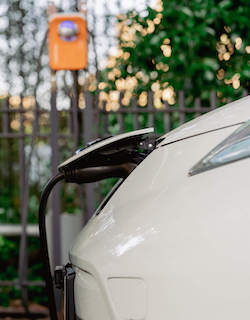
Public Electric Vehicle Charging Infrastructure Playbook
April 2024
Read this guidebook to help plan and build public EV charging infrastructure in your community.
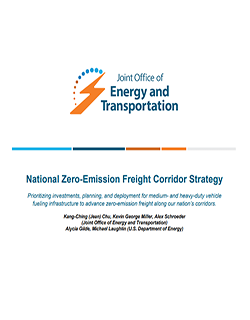
National Zero-Emission Freight Corridor Strategy
March 2024
This strategy document from the Joint Office, in collaboration with the U.S. Department of Energy, U.S. Department of Transportation, and the Environmental Protection Agency, prioritizes investments, planning, and deployment for medium- and heavy-duty vehicle fueling infrastructure to advance energy efficient freight along the nation’s corridors.
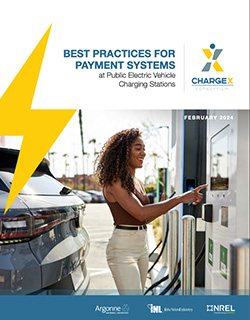
Best Practices for Payment Systems at Public Electric Vehicle Charging Stations
March 2024
This report from the ChargeX Consortium summarizes electric vehicle (EV) charging payment challenges and proposed solutions.
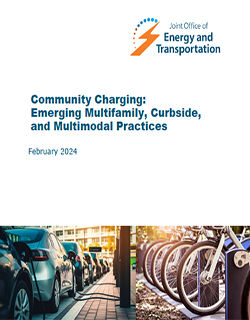
Community Charging: Emerging Multifamily, Curbside, and Multimodal Practices
February 2024
The U.S. Department of Transportation Volpe Center authored this white paper for the Joint Office, which coalesces emerging practices and technologies that can bring the benefits of electric mobility infrastructure to residents in multifamily housing, residents dependent on curbside or on-street parking.
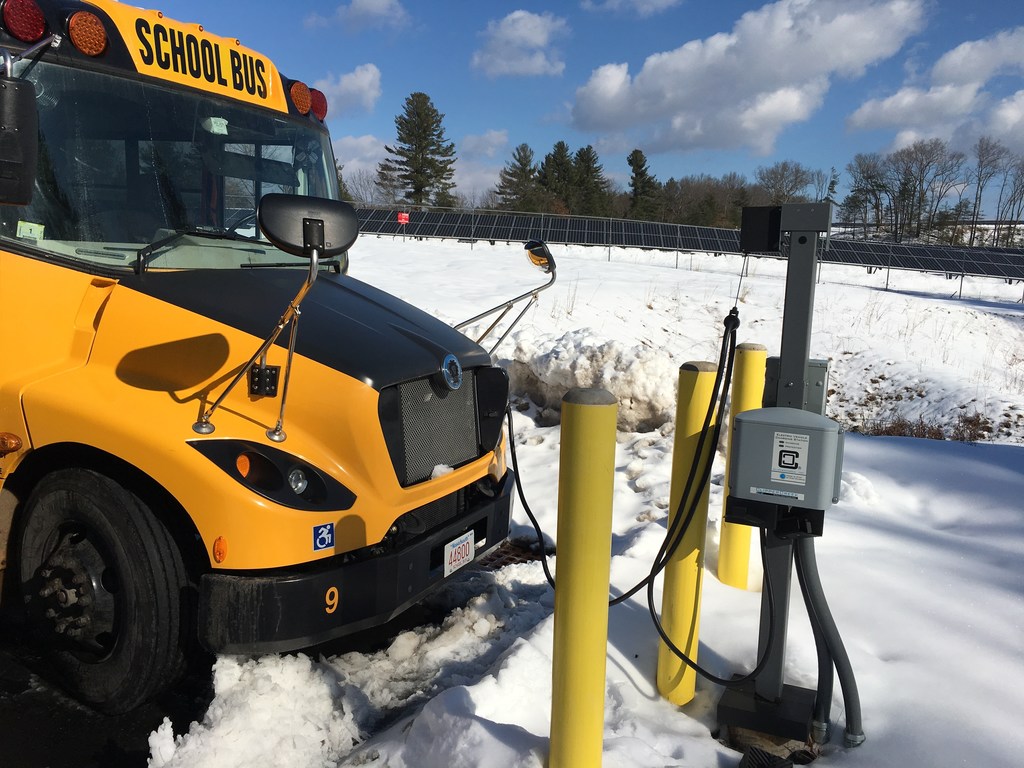
Cold Weather Impacts on Electric School Buses
February 2024
This help sheet explains how cold weather impacts electric school buses and shares the Joint Office's recommended approaches for greater energy draw, optimizing performance, and maximizing range.
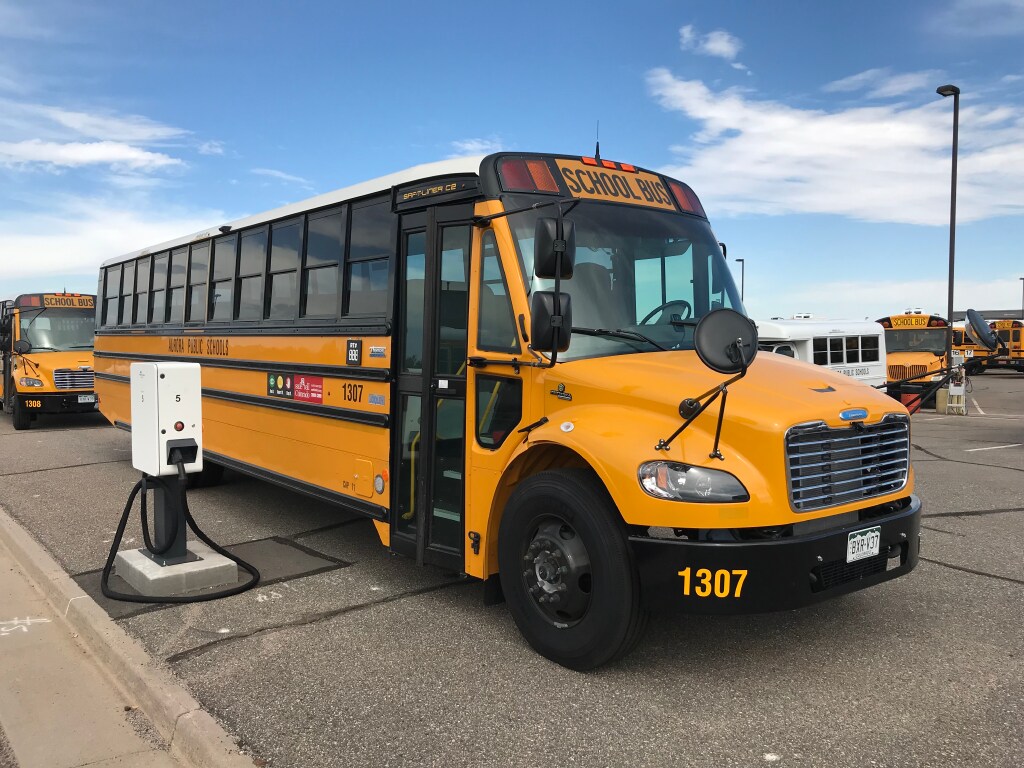
Quick Start to Electrifying Your School Bus Fleet
December 2023
School bus fleet managers can use this help sheet as a guide for fleet electrification.
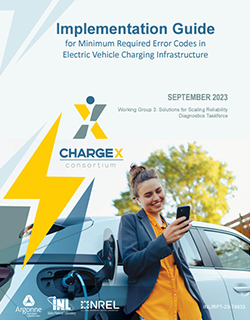
Implementation Guide for Minimum Required Error Codes in Electric Vehicle Charging Infrastructure
December 2023
This guide from the ChargeX Consortium offers an in-depth analysis of the Minimum Required Error Codes defined in “Recommendations for Minimum Required Error Codes for Electric Vehicle Charging Infrastructure.
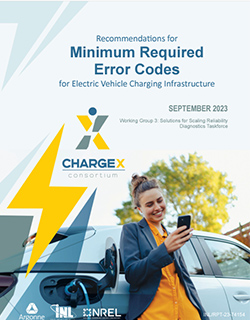
Recommendations for Minimum Required Error Codes for Electric Vehicle Charging Infrastructure
December 2023
This report from the ChargeX Consortium proposes a set of standardized Minimum Required Error Codes to address the challenges associated with custom error codes in the North American electric vehicle charging ecosystem.
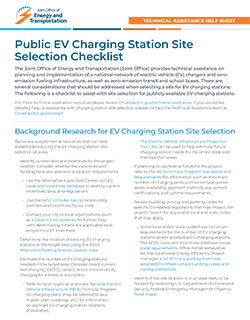
Public EV Charging Station Site Selection Checklist
October 2023
This checklist provides a high-level overview of key steps and resources to guide stakeholders through the electric vehicle charging station site selection process.
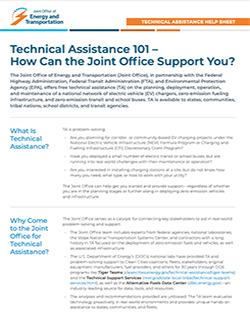
Technical Assistance 101 – How Can the Joint Office Support You?
October 2023
This help sheet offers an overview of the free technical assistance available through the Joint Office.
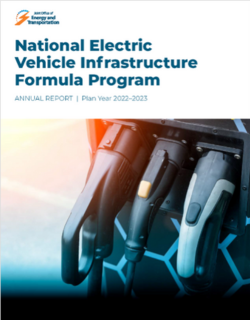
National Electric Vehicle Infrastructure Formula Program Annual Report, Plan Year 2022-2023
July 2023
This report from the Joint Office of Energy and Transportation summarizes key activities in relation to the NEVI Formula Program and provides an overview of initial state EV infrastructure deployment plans.

Sample Cybersecurity Clauses for EV Charging Infrastructure Procurements
June 2023
Pacific Northwest National Laboratory, Idaho National Laboratory, and the Joint Office developed the sample cybersecurity procurement language clauses in this report that can be modified for use in requests for proposals and electric vehicle service provider contracts.
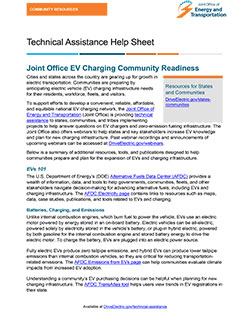
Technical Assistance Help Sheet: Electric Vehicle Charging Community Readiness
June 2023
This help sheet provides a summary of resources, tools, and publications designed to help communities prepare and plan for the expansion of EVs and charging infrastructure.
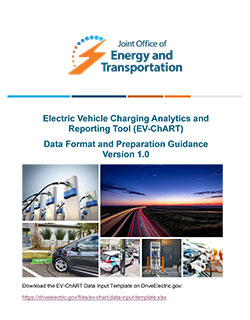
May 2023
The EV-ChART Data Format and Preparation Guidance provides a comprehensive overview of the data reporting requirements as authorized under 23 CFR 680.112. The Joint Office of Energy and Transportation maintains EV-ChART, which provides a centralized hub for submitting electric vehicle (EV) charging infrastructure data directed by the Federal Highway Administration. EV-ChART is scheduled to launch in early 2024.
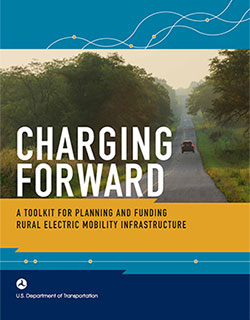
Charging Forward: A Toolkit for Planning and Funding Rural Electric Mobility Infrastructure
May 2023
This toolkit provides resources from the U.S. Department of Transportation to assist rural stakeholders with planning for EV charging infrastructure.



